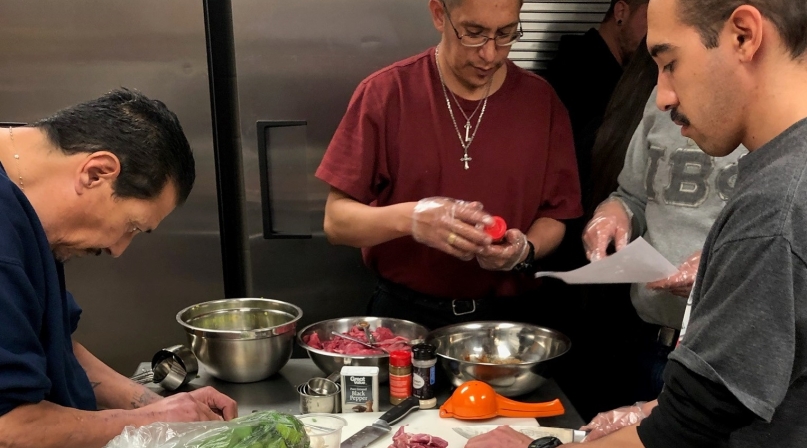Problem:
|
Individuals with substance abuse issues often do not feel like members of the local community.
|
Solution:
|
Form a partnership to focus on community reintegration for individuals living substance-free.
|
The Bernalillo County, N.M. Department of Behavioral Health Services teamed up with the county’s Parks and Recreation Department to use community outings to help reintegrate individuals struggling with substance abuse back into the community.
The collaboration is through the Department of Behavioral Health Services’ Supportive Aftercare Program, which opened in 2009.
Individuals struggling with addiction issues can use the transitional living communities as safe spaces to work on recovery through the program.
Located in Albuquerque’s International District, the program uses a 24-week curriculum focusing on cognitive-behavioral substance abuse intervention where clients have access to community space and resources.
Behavioral Health Services Clinical Manager Megan Aragon said the main goal of the Supportive Aftercare Program is for individuals to successfully reintegrate as members of the community.
“We really want clients to realize that as much as they take from the community, they can give back to the community and become functioning again,” she said.
Clients involved in the program from October 2016 to October 2017 experienced a significant decrease in local jail bookings from 4.19 percent to .31 percent as well as a drop in the need for detox services, which decreased from 650 total times to 253 times.
Through the program, clients are encouraged to vote in local elections, learn about local community resources and participate as an active member of their own community while being substance free.
“We saw the need to get clients more engaged in the community in different ways,” Aragon said.
Bernalillo County took the program one step further by forming a collaboration between the Department of Behavioral Health Services and the Parks and Recreation Department to provide clients with unique experiences to aid in reintegrating them into the community.
Recreation Coordinator Danielle Fast said Behavioral Health Services wanted to add a recreational side to enhance the Supportive Aftercare program.
Learn More
Bernalillo County’s Supportive Aftercare Program is the recipient of a Best in Category 2020 NACo Achievement Award in the Parks and Recreation category.
The collaboration allows clients to experience events that they may have not been able to otherwise.
Parks and rec staff pick up clients from the program to participate in a variety of activities and outings including photography classes, quilting, ceramics, pottery making, cooking classes, archery and swimming.
Fast, who was one of the first instructors for the partnership, taught photography.
“Being in that place of sobriety totally enhances this experience because now they’re actually solidified memories and good memories that they can actually pass on to their children and their children’s children,” Fast said.
Other outings include skiing, fishing, attending football and basketball games, going to the ballet and attending classes on topics such as meal planning.
“There’s another spectrum of adults who are now transitioning their lives and we get to be a part of that and show them the healthy side of things,” Fast said.
The collaboration has utilized local community centers throughout the county to diversify the experiences offered to clients.
“Let’s expose them to new things in their recovery that show them that there’s excitement outside of substance use and there’s ways to utilize their time and engage in new hobbies or expose them to new experiences that some of them have never gotten to engage in,” Aragon said.
Fast described the parks and recreation department’s involvement with the Supportive Aftercare Program as a “supporting leg” that enhances the curriculum.
“Now they’re getting that social aspect in a fun way and not just trying to find themselves in society in general, but recreationally,” Fast said.
The program adjusted during the COVID-19 pandemic with the departments holding activities outside with more limited events indoors while wearing masks and observing social distancing protocols.
Aragon advises other counties to reach out and collaborate with other departments to help individuals facing substance abuse issues reintegrate into the community.
“That’s what it’s about at the end of the day, is these clients and getting them to change their perspective of what life and recovery can be,” Aragon said.
Fast said other departments should think outside of the box to aid clients in transitioning back into society.
“We’re constantly being innovative of how we alter our programs to suit their needs as well as meet our goal of just reaching out to our community in different ways,” she said.




